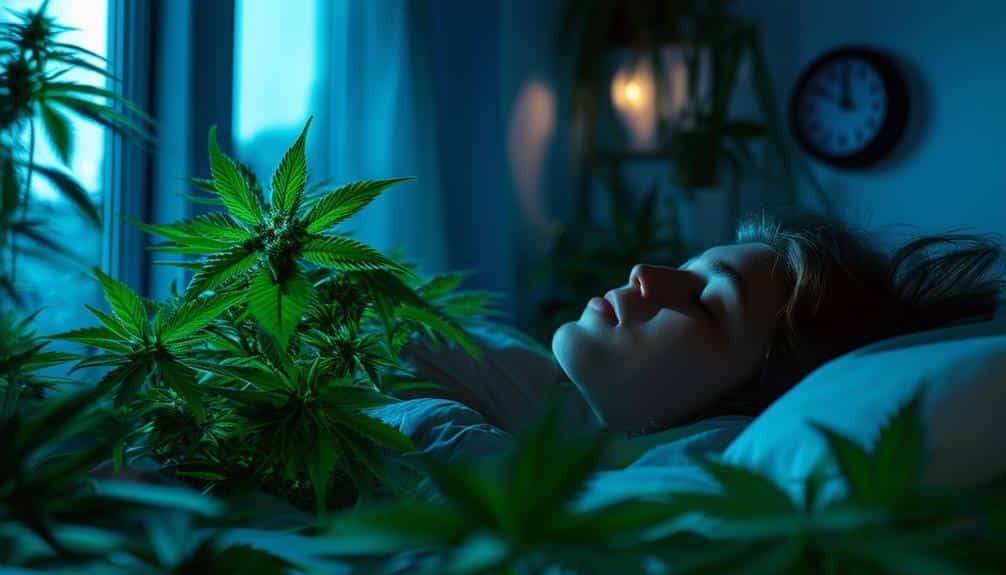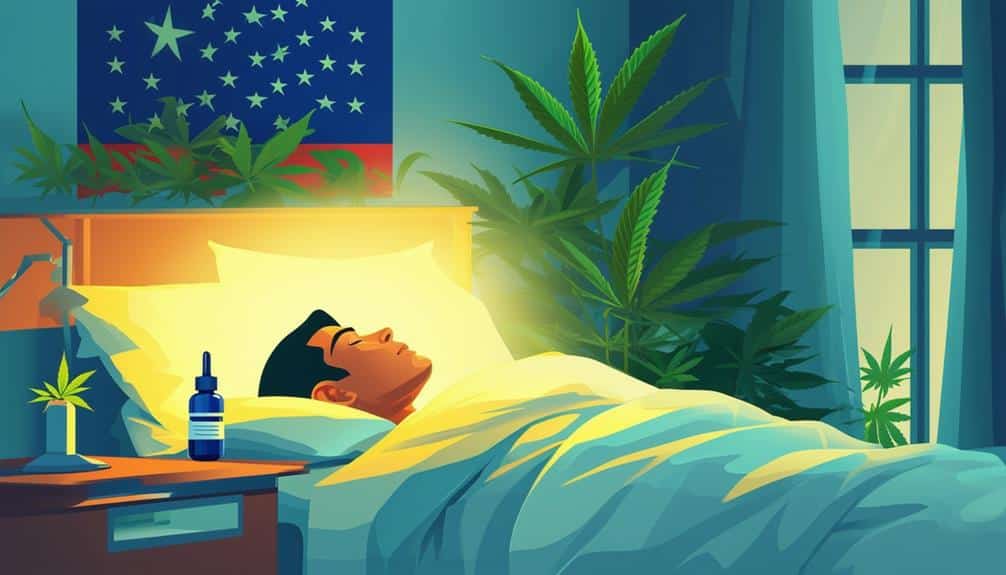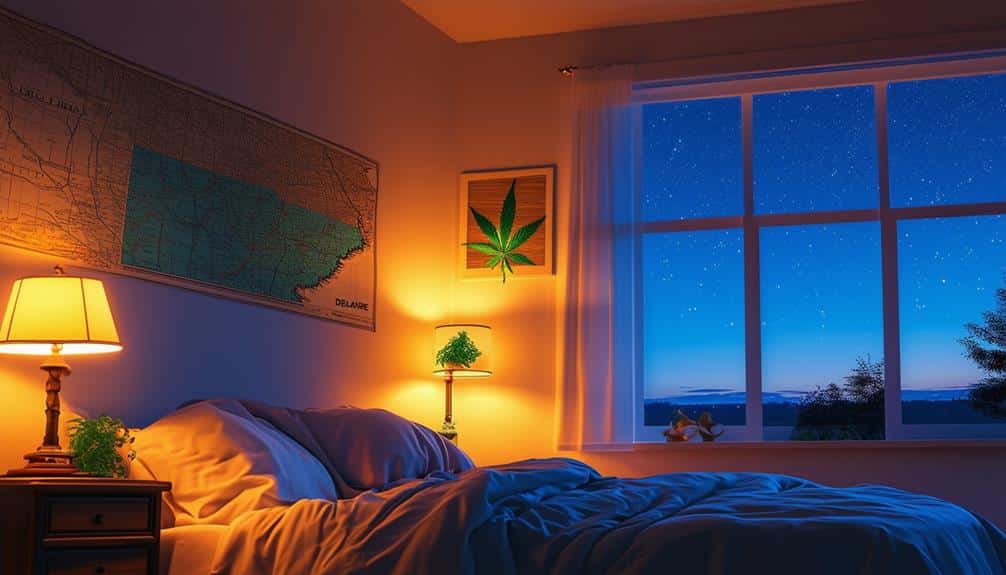Did you know that Delaware has legalized medical marijuana specifically for conditions like insomnia? If you’ve been struggling with sleepless nights, this could be a game-changer for you. Medical marijuana interacts with your endocannabinoid system, helping to regulate sleep patterns and reduce nighttime anxiety. Imagine finally being able to fall asleep faster and enjoy uninterrupted rest. By consulting with a licensed physician and obtaining a medical marijuana ID card, you can access safe, controlled cannabis products designed to improve sleep quality. Curious about how this might work for you?
Table of Contents
Understanding Insomnia

Insomnia is characterized by difficulty in either falling or staying asleep, which significantly impacts both the quality and duration of sleep leading to various adverse health outcomes. As someone dedicated to helping others, understanding the common causes of insomnia is important.
Factors such as stress, anxiety, and depression frequently contribute to this condition. Additionally, poor sleep hygiene including irregular sleep schedules, excessive screen time before bed, and consumption of stimulants like caffeine can exacerbate insomnia.
You should be aware that addressing these common causes is crucial in managing insomnia effectively. Stress reduction techniques such as cognitive behavioral therapy can alleviate anxiety and improve sleep quality. Furthermore, establishing good sleep hygiene practices is essential.
We encourage individuals to maintain a consistent sleep schedule create a restful sleeping environment and limit screen exposure before bedtime.
Legal Status in Delaware
In Delaware the legal framework for medical marijuana permits its use for treating specific qualifying conditions, including insomnia. As a healthcare professional or caregiver, understanding this framework is essential for facilitating patient access to effective treatments.
Delaware’s medical marijuana program established under the Delaware Medical Marijuana Act provides a structured pathway for patients to obtain medical cannabis.
To qualify, patients must:
- Possess a certification from a licensed physician confirming the diagnosis of a qualifying condition.
- Apply for and receive a medical marijuana ID card from the Delaware Department of Health and Social Services (DHSS).
- Purchase medical marijuana only from state-licensed compassion centers.
- Adhere to possession limits specified by the law, which currently stand at six ounces.
These regulations ensure that patient access is both controlled and safe minimizing the risk of misuse while maximizing therapeutic benefits.
By following these guidelines you can help patients navigate the complexities of medical marijuana use legally and ethically. Moreover staying informed about any updates to the legal framework is essential as legislation can evolve potentially broadening the scope of conditions treated or adjusting access protocols. This vigilance guarantees that you’re always equipped to provide the best care possible.
How Medical Marijuana Works

Medical marijuana works by interacting with your endocannabinoid system (ECS) to regulate various physiological processes including sleep. The ECS consists of endocannabinoids, cannabinoid receptors, and enzymes that modulate a range of functions essential for homeostasis.
When you use medical marijuana for insomnia treatment its active compounds—primarily cannabinoids—bind to cannabinoid receptors mainly CB1 and CB2 which are dispersed throughout your central and peripheral nervous systems. Activation of these receptors influences neurotransmitter release promoting relaxation and reducing anxiety levels both of which are vital for sleep regulation.
Research has shown that the ECS plays a pivotal role in maintaining sleep-wake cycles, and imbalances in this system can contribute to sleep disorders like insomnia. By targeting these cannabinoid receptors medical marijuana can help restore balance thereby improving sleep quality and duration.
Furthermore clinical studies indicate that medical marijuana can decrease the latency to sleep onset and increase total sleep time. This makes it a viable option for those seeking natural insomnia treatment. By leveraging the body’s own ECS medical marijuana offers a targeted approach to addressing sleep difficulties enhancing overall well-being for Delaware residents suffering from insomnia.
THC Vs. CBD for Sleep
When comparing THC and CBD for sleep understanding their distinct mechanisms and effects on the endocannabinoid system is crucial.
THC (tetrahydrocannabinol) primarily acts as a partial agonist at CB1 receptors in the brain promoting sedation and altering sleep latency. This can be beneficial for those struggling to fall asleep quickly. However THC effects include potential psychoactive experiences which might not be suitable for all patients.
On the other hand CBD (cannabidiol) interacts differently with the endocannabinoid system exerting its influence primarily through indirect action on CB1 and CB2 receptors. The benefits of CBD for sleep are often attributed to its anxiolytic and anti-inflammatory properties which can contribute to a more restful and uninterrupted sleep cycle without the psychoactive side effects.
Consider the following when deciding between THC and CBD for sleep:
- Onset and Duration: THC has a quicker onset but shorter duration, while CBD offers prolonged benefits.
- Side Effects: THC may cause psychoactive effects; CBD is non-intoxicating.
- Tolerance Development: THC can lead to tolerance; CBD is less likely to do so.
- Regulatory Status: CBD is often more widely accepted and legally accessible.
Understanding these differences helps tailor therapeutic strategies to individual needs ensuring the best patient outcomes.
Reducing Nighttime Anxiety

To effectively reduce nighttime anxiety can greatly enhance sleep quality and overall well-being for individuals suffering from insomnia. Medical marijuana particularly strains rich in cannabidiol (CBD) has shown promise in alleviating anxiety symptoms that can disrupt sleep. When you aim to support patients in maintaining best sleep hygiene integrating medical marijuana can be a meaningful intervention.
CBD interacts with the body’s endocannabinoid system to produce anxiolytic effects thereby helping to calm the mind before bedtime. This can be particularly beneficial when combined with mindfulness practices which are designed to promote relaxation and reduce stress levels. By encouraging patients to adopt these combined strategies you can help them achieve a more restful night’s sleep.
Moreover medical marijuana can be tailored to individual needs enhancing its effectiveness. It’s vital to stress the importance of starting with a low dose and gradually adjusting to find the most suitable therapeutic level. By integrating medical marijuana with pre-existing sleep hygiene protocols including maintaining a consistent sleep schedule and creating a restful sleep environment you can notably reduce the nighttime anxiety that often exacerbates insomnia.
This holistic approach can lead to improved patient outcomes and a higher quality of life.
Improving Sleep Quality
Enhancing sleep quality with medical marijuana involves selecting the appropriate strain and dosage to achieve the desired therapeutic effects. To improve results, you should focus on strains high in cannabidiol (CBD) and low in tetrahydrocannabinol (THC) to promote relaxation without significant psychoactive effects. The right strain can help regulate sleep disorders by encouraging melatonin production ultimately enhancing sleep quality.
Incorporating medical marijuana into a thorough sleep hygiene plan can be particularly effective. Pairing it with other relaxation techniques can further boost its benefits.
Here are some key considerations:
- Strain Selection: Choose strains known for their sedative properties to assist in falling and staying asleep.
- Dosage Timing: Administer the medication 30-60 minutes before bedtime to align with the body’s natural sleep rhythms.
- Combination with Sleep Hygiene: Maintain a consistent sleep schedule, creating an ideal environment for sleep.
- Integration with Relaxation Techniques: Practice mindfulness, meditation, or deep-breathing exercises alongside medical marijuana use.
Safe Consumption Methods

To guarantee the safe consumption of medical marijuana for insomnia, it’s crucial to consider methods such as vaporization, tinctures, and edibles which offer controlled dosing and minimize respiratory risks. Vaporization provides significant benefits by heating cannabis to a temperature that releases cannabinoids without combustion thereby reducing exposure to harmful toxins and irritants found in smoke. This method ensures a rapid onset of effects making it easier to titrate doses and achieve the desired therapeutic outcomes.
Tinctures offer another precise method of administration allowing you to measure exact doses using a dropper. This sublingual application facilitates rapid absorption into the bloodstream providing prompt relief from insomnia symptoms. It’s particularly advantageous for those who require quick adjustable dosing throughout the night.
Edibles present a discreet and long-lasting option though they require careful attention to edible dosages to avoid overconsumption. The delayed onset of effects—typically 30 to 90 minutes—necessitates starting with a low dose and waiting to gauge its impact. This method is well-suited for individuals seeking prolonged relief without the need for frequent re-dosing.
Potential Side Effects
While safe consumption methods mitigate some risks, it’s important to recognize the potential side effects of medical marijuana for insomnia which can include dry mouth, dizziness, and cognitive impairment. Understanding these side effects can guide you in making informed decisions and optimizing patient care.
Common short-term side effects include:
- Dry mouth: Also known as xerostomia, this condition can cause discomfort and increase the risk of dental issues.
- Dizziness: This can lead to instability and increase the risk of falls particularly in elderly patients.
- Cognitive impairment: Short-term memory and attention span may be affected impacting daily activities.
- Fatigue: While marijuana is used to promote sleep it can also cause residual tiredness the next day.
Considering the long-term effects chronic use may lead to tolerance dependency and potential exacerbation of mental health issues such as anxiety or depression. Adherence to proper dosage guidelines is critical to minimize these risks. Additionally interactions with other medications must be carefully monitored to avoid adverse effects.
When evaluating medical marijuana as a treatment option weigh these potential risks against the benefits. By staying informed about dosage guidelines and possible interactions you can better serve patients and contribute to their overall well-being.
Consulting a Medical Professional

Regular consultation with a medical professional is crucial to ensure that medical marijuana is a safe and effective treatment for your insomnia. Your healthcare provider can evaluate your specific condition review your medical history, and determine if medical marijuana is appropriate. They may also recommend integrating other evidence-based interventions such as improving sleep hygiene and making dietary changes, to optimize your overall treatment plan.
In addition to medical marijuana, your provider might suggest cognitive behavioral therapy (CBT) as a complementary approach. CBT has proven efficacy in treating insomnia by addressing the underlying cognitive and behavioral factors contributing to your sleep difficulties. Incorporating relaxation techniques such as progressive muscle relaxation or guided imagery can further enhance your ability to fall and stay asleep.
Your healthcare provider will monitor your progress and adjust your treatment plan as needed. They can also educate you on potential interactions with other medications you’re taking and advise on appropriate dosing to minimize side effects.
Conclusion
Imagine finally drifting into a restful sleep without the endless tossing and turning. Medical marijuana could be the key for Delaware residents grappling with insomnia. Consulting a licensed physician and acquiring a medical marijuana ID card might be your next step.
With its potential to reduce nighttime anxiety and enhance sleep quality, the promise of a good night’s sleep could be within reach. But, could this be your ultimate solution? Only a consultation will reveal the answer.
If you’re curious to learn more about how medical marijuana can help with insomnia why not visit Cannabis Docs of Delaware? We’re here to answer all your questions and guide you through the process.
Feel free to give us a call at (855) 420-6797. We can’t wait to help you on your journey to better sleep!

